Popular Cholesterol Pills Now Made of Broken Glass

A generic version of the widely-used Liptor anti-cholesterol drug is being recalled because the pills are full of “glass particles,” which we guess is a bad thing? People take so many pills!
And you know how the generics are always a lot cheaper, and who cares because it’s not like the brand of the medicine is something you care about? Well, one reason these particular pills are cheaper is because they come from some sketchy factory in India — far away from the U.S. Food and Drug Administration, which does a pretty lousy job of protecting the food and medicine supply right here in the United States. For instance, one of the worst recent cases was an incredibly disgusting and filthy Children’s Tylenol factory where “undocumented bacteria was living in the vats of drug ingredients” in Philadelphia.
Ranbaxy Pharmaceuticals Inc. has recalled dozens of lots of its generic version of cholesterol drug Lipitor because some may contain tiny glass particles, the latest in a string of manufacturing deficiencies that once led U.S. regulators to bar imports of the Indian company’s medicines.
Americans take so many prescription drugs. It is kind of amazing that we, as a people, can live for nearly a hundred years on a diet of Costco ribs and 2-liter bottles of corn syrup, all because we ingest a staggering amount of pills from the age of 28 or so until we are finally dead, seven decades later. For example, most Americans are high on “synthetic heroin,” right now.
The Guardian examined our American appetite for prescription dope, and came up with some appalling information:
Americans make up less than 5% of the global population but consume 80% of the world’s supply of opioid prescription pills. Sales of the drugs have increased more than fourfold in the past 10 years, grossing $11 billion annually. To express that figure more personally, in 2010 enough [opioid pills] were handed out by doctors to medicate every American adult with a typical dose of hydrocodone, a pure opioid as powerful as morphine, every four hours for a month.
Is this the “prescription drug benefit” people like John McCain always talk about, when they briefly pop up from a mid-morning nod out?
The "Retrenchments and Narrowings" of Salman Rushdie

Some of his most egregiously uncharitable moments occur when writing about his four marriages….In a close-run contest between Marianne Wiggins (number two) and Padma Lakshmi (number four), it is the latter who emerges as the worst of the spousal bunch. Rushdie presents her as the Marion Davies to his William Randolph Hearst — an erotically beguiling but fundamentally vapid gold digger, whose selfish ambitions as a model, actress, and TV host have, in the end, “nothing to do with the fulfillment of his deepest needs.” The final revelation of her shallowness comes in the wake of September 11 when Rushdie, grieving and shaken and feeling the need to connect with loved ones, calls her in Los Angeles and finds her “doing a lingerie shoot.”
Rushdie’s shuddering hauteur at this moment may strike the reader as a bit rich, coming from a man who spends much of his memoir recalling encounters with pop stars, Playboy bunnies, and “hot” pop-star girlfriends in the breathless style of a young Austen character writing up her first visit to the pump rooms at Bath.
Please Meet Michael Macher, Our Associate Publisher

Choire: Who are you, and what are you doing in my office????
Michael: I’m your new Associate Publisher! I come from HuffPost where I was most recently leading their content marketing efforts.
Choire: Oh good, then you are not a burglar. Michael Macher, can you explain to me what content marketing is? That’s something I should probably know but just don’t.
Michael: Content Marketing emerged from the insight that brands are now becoming content creators. Rather than injecting advertising into banner ads, they are creating things that users actually want to engage with. It also comes from the insight that social media is becoming a more viable way to distribute those creations. So now we get to use flashy new words like “native advertising” to talk about how brands are partnering with publishers to create integrated experiences.
Choire: This is great, you are like our own personal Siri, I can just ask you crazy made-up questions and you will tell me. So, when you were a younger man, having grown up in Dallas and then attending Vermont’s terrific Marlboro College, what did you dream of being when you grew up? Was it that you were watching “Sex and the City” and therefore decided you must move to New York City?
Michael: Like most young men living in Dallas, “Sex and the City” was a huge influence in my formative years. But actually my first professional aspiration — when I was six years old — was to be a priest.
Choire: !!!
Michael: Mainly because I had this weird notion that priests travelled the world and lived and ate for free. Anyway THAT was weird. Later on, as a philosophy student in college, I was convinced I was going to go to grad school and try for a career in academia. But by the time I had finished my undergraduate thesis I was pretty disenchanted with that scene. So I moved to New York! I got a job as an intern on the editorial side of HuffPost and the rest is history.
Choire: That is an amazing story.
Michael: It is my life story.
Choire: Lightning round! Žižek or Spivak?
Michael: Spivak! Her idea of “strategic essentialism” makes a lot of sense to me! Or it did in college?
Choire: Judith Butler or Eve Sedgwick?
Michael: Eve Sedgwick, because Judith Butler’s prose style is impenetrable.
Choire: Oh, #roasted. Cats or dogs?
Michael: Dogs. Sorry! I used to work at a doggy daycare in Richardson, TX and it was the best job I’ve ever had. They helped me get over my humanist phase.
Choire: ICE CREAM OR CAKE?
Michael: Ice cream.
Choire: Finally, and most importantly: what is your signature recipe?
Michael: My signature recipe is actually a dish my mom completely made up and it is called “Cowboy Food.” It’s ground beef, spanish rice, and black beans all mixed together. Cook a bunch and then add one bottle of whatever hot sauce you like. Then top with frito chips and chipotle cheddar cheese. Classy and delicious.
Choire: My God. Welcome to the team, Michael Macher!
David Mamet Is 65
David Alan Mamet turns 65 today. There are all sorts of things I could say about him, and many of his ideas and proclamations make him what I guess we would call “problematic” or whatever, but is he the greatest playwright of the last quarter of the 20th century? It says here yes. (Should you feel the need to point it out in the comments I am indeed a heterosexual white man etc.) In any event, it’s the man’s birthday today. For the plays, the movies (okay, The Verdict, The Untouchables and House of Games at least) and that episode of “Hill Street Blues” he wrote, I wish him a happy one.
Rich Places Rich
“The family’s patriarch and matriarch keep a low profile, splitting their time between a large, lavishly furnished apartment on Paris’ famous Left Bank and a 6,000 acre estate in the sought-after Loire Valley.”
— Don’t you think there’s something going wrong over at Forbes
when they decide they have to apply descriptors to “Left Bank” and “Loire Valley”?
Where Will You Lasses Get Your Stockings Stuffed?
Competing indie lady-oriented holiday craft fairs! Oh if this were only a romcom or a sitcom, it’s such a good setup. The Bust Mag Craftacular (Mercer St. south of Spring) and the Etsy Holiday Shop (Greene St. just south of Houston) are both happening. And so near! WHEREVER will YOU buy your INDIE GAL GEEGAWS?
Yes there’s more, on the events calendar, which has things pretty much on the right day, unlike this podcast, which goes a bit off the rails.
Incredible Art Gifts For The Holiday Season (That Don't Yet Exist)
by Drew Dernavich
Calendars! Monthly calendars and tchotchkes. That’s the Thomas Kinkade approach to gift giving: Culture as knickknack. Slap the Mona Lisa on a mug. Stick a picture of Monet’s water lilies on a mousepad, and you’re done. But do we really have to settle for such obvious choices? If you’re a supporter of the visual arts, you should want gifts that are both more fun and more meaningful. I certainly do, and I’ve put together a list of the art-related gifts I’d like to see this holiday season.
Edvard Munch’s “The Scream” front-load washer sticker

Because the only thing worse than being trapped in a state of existential dread is being trapped in a laundromat, right?
The Haringizer! mobile phone app

Upload a picture of yourself to this app, and, using state-of-the-art morphing technology, it will produce a unique, one-of-a-kind customized portrait of yourself — the way Keith Haring would have done it!
Jenny Holzer bit.ly converter
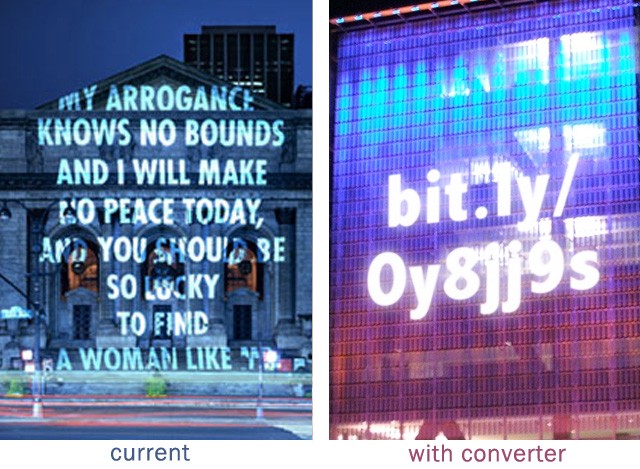
Holzer’s ‘truisms’: so pithy and incisive. But who has time to read them? This filter would convert them to bit.ly links so you would be able to fit them into your schedule.
Pablo Picasso “Guernica” PowerPoint template
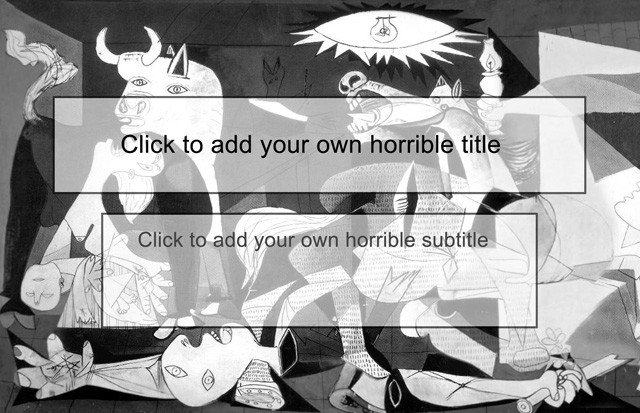
Compared to the unspeakable horrors of war, the unspeakable horrors of your 3rd quarter sales presentation won’t seem so bad.
Rembrandt’s “The Storm on the Sea of Galilee”

Remember how this painting was stolen from Boston’s Isabella Stewart Gardner Museum in 1990? Dear whoever took it: you’ve had it long enough. Plenty of people would like to see this in their stocking, hint, hint.
“Fruit Freshetta” fruit arrangements, inspired by Frank Frazetta
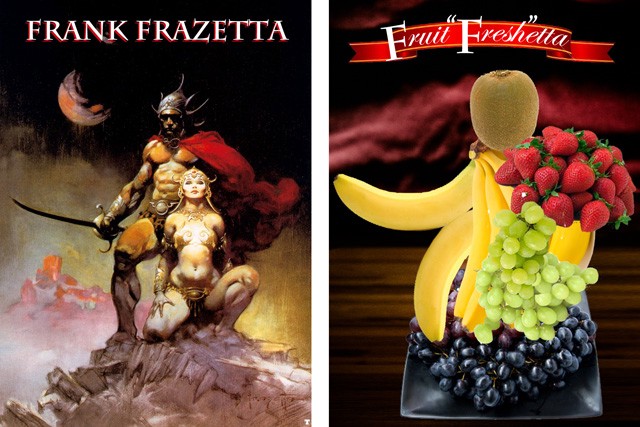
Few people can afford an original painting from Frank Frazetta, the iconic 20th-century fantasy painter known for his throbbing and voluptuous depictions of musclebound men and buxom women. But a throbbing and voluptuous fruit arrangement that looks exactly like a Frazetta would be a lot more affordable, and also delicious!
The Upper West Side
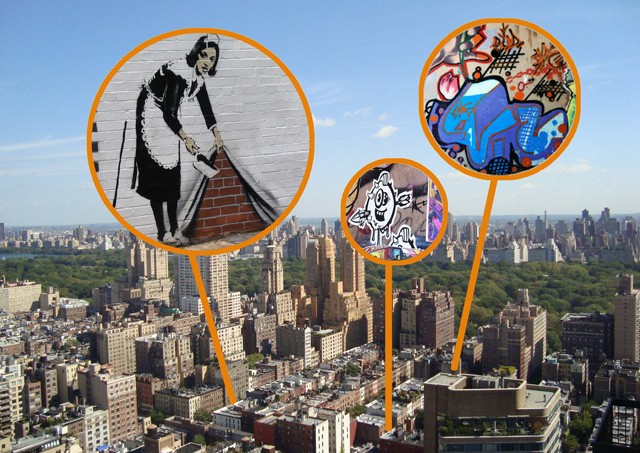
We can’t all be daring and cool like Banksy, inconspicuously slipping in and out of urban neighborhoods and spray painting bold images onto the sides of buildings. At least not without getting caught. But if somebody would simply give me the entire Upper West Side as a gift, I’d gladly use it to practice my spray painting technique until I got it right. I’d also accept Gowanus, Bushwick, or Jersey City.
H. R. Giger pasta
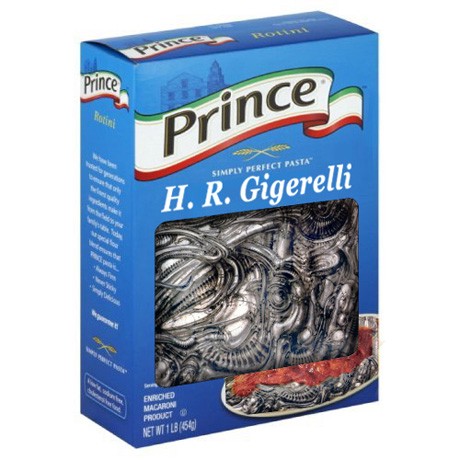
The art of this Swiss surrealist, best known for his art design for the Aliens movie franchise, is full of unsettling biomechanical imagery. I always thought it kinda looked like spaghetti. What would it be like with a little marinara?
Not an actual Lexus with a bow on it in your driveway, but a sculpture of a Lexus with a bow on it in your driveway (inspired by Andy Warhol)

Get it?
Sadly, this marks the year’s close on the Reviewing With Light series, which began last January. Remember?
Drew Dernavich is a cartoonist for the New Yorker magazine (not that cartoonist — the other one) and the co-creator of the cartoon improv show Fisticuffs! He is on Twitter.
New York City, November 28, 2012

★★★★ A few windows, off in New Jersey, caught the fiery rising sun; a few washes of pink touched the clouds; a few fissures of pale blue shone between. Little touches. The baby had shaken off his share of everyone’s seasonal cough well enough to tear his albuterol rig apart and scatter the pieces across three rooms. Outside was cold and bright, with not enough wind to dispel the griddle smell around the coffee cart. Attractive thin, high clouds gave way to equally attractive lower, fluffier ones. The long shadows of fire escapes fell across the faces of the buildings on Lafayette Street. Late light again lanced its way into the dark office. By night time, the breeze was sufficient to knock down a raised coat hood. Wearing a hat would have been smarter.
My Books Of Sad Jews
My Books Of Sad Jews
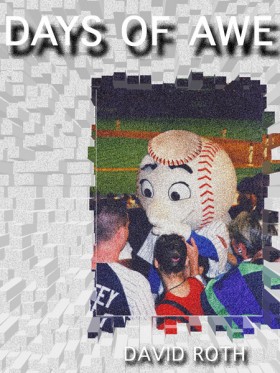
As National Novel Writing Month enters its final days, the next in our series about the novels that we started writing but, for whatever reason, never finished.
There’s a novel I didn’t write, and another novel that I did. I’ll tell you about the second one first. It’s finished — or notionally finished and objectively un-sold, although my agent tells me it received several posi-polite notes of no-thanks — and still here with me. It’s in my head, and at least virtually is right there on this laptop’s desktop, where it is both ostensibly complete and current through my last idle tinkerings with it, which I made on a slow and stop-full train trip back from Connecticut a few months ago. I like it well enough, although of course I would, because I wrote it and because most of the people in it sound somewhat like me, and because it’s about a life and family I could, and in some ways do, actually have.
So the novel I did write is about what I know about, which is New Jersey and a certain phylum of difficult Jewish people and the New York Mets. While I suppose I’m up to adding some steampunk erotica or radioactive and abruptly predatory carp or whatever onto the story if it would help, and while the judgment of various esteemed publishing houses is entirely to the contrary, I actually think the thing is pretty good, and that it succeeds to the extent that what I know about what I wrote about is able to mostly mitigate how little I know about writing a novel.
I haven’t written any new fiction in a while, but I still spend some time turning over this old-and-getting-older bit of fiction, not so much in hopes of somehow selling the novel as in the hope that I might finally feel finished with it. I hear and see things on the street that I describe in the novel, and I want to go home and make them righter and better; I find myself in places that I described a couple years ago, in some round or other of last frantic edits, and notice some small thing or things that I missed, the sum of which might have added up, cumulatively, to some greater difference.
There is some darkest-Borgesian timeline in which I spend the rest of my life at this: continually improving this bloating document, tweaking and perfecting it, keeping it scrupulously current, updating the characters with whatever many new insights into them I will surely have, until one day I have a novel of a thousand wild, lifeless and exhaustingly meticulous pages, in which every character is a perfect avatar for my past-madness eightysomething self, who by this point would look like Burgess Meredith and would be padding around the apartment in a R.A. Dickey name-and-number t-shirt with mustard stains on it. The book’s characters will all spend their airless-spotless hours griping perfectly about Mel Rojas or some other doomed Mets relief pitching hump from the 1990s, and will do so from impeccable high-def renderings of the shredded pebbly booths in a couple of East Village bars that closed before the weather even got cold in 2001.
There are less dark outcomes — for instance, the long present, in which I write all the time about various things, mostly enjoy it and can barely imagine what it might feel like to have the air, space, time or inclination to write a novel. But a novel that never gets finished, or barely gets started, haunts a lot less than the closer-to-real thing. The novel I finished is called Days of Awe, after the period between Rosh Hashanah and Yom Kippur. The book is set during that week, with nine years separating each of three sections. I don’t imagine that it’s giving much away to point out that the Mets stink out loud in each of those thirds. I think I prefer the unfinished one, at this point.
***
So, the unfinished one is the non-haunter. It’s a goofy zygote, if it’s that. Such as it exists it consists entirely of a smudgy page of notes on a legal pad, some-odd hours of insomniac brainstorming, and a couple thousand words of beginning — a drunk kid wiped out on a college quad next to a capsized campus-security golf cart, with a camp sec dude standing over him; their interaction. From there… well, that’s the relief of it: it’s all still, quiet, white space.
Or not entirely, at least to the extent that I know what it was going to be about. It was to be a sort of thwarted revenge story, with a family and a multinational corporation at the center of it, and also something something the queasy impunities and dozens of absent accountabilities and slow, doofy-brutal inevitabilities that defined the year 2005. The title I picked for it, Majestyk, was a play on an Elmore Leonard novel about a watermelon farmer and Vietnam veteran who is Pushed Too Far by the local mob; that Charles Bronson played the watermelon farmer in the 1974 movie adaptation Mr. Majestyk should be a good hint as to how Majestyk handled the Pushed Too Far thing.
The joke in that title was that the revenge-seeker would be a young n’ conflicted fuck-up who had been freshly suspended from college — thus the capsized golf cart, and write what you know and so on. The joke, further, would be that the revenge-ist would not do anything in the squinty-brutal-Bronsonian mode so much as he would just get himself a temp job at a corporation that had wronged his mother, and then do some anxious scotch-dulled creeping around and dork-o espionage, and then some other things would happen — the fax machine at the office breaks, or maybe our protagonist has a romantic relationship, or both if there is time — and then our protagonist and our reader would ultimately confront individual futility and the ways in which permanence and unaccountability and influence insulate and isolate and pervert people, and make justice slow and difficult.
This is — even in the parts that don’t involve being a twentysomething doofus with big, defective ideas — me sort of writing what I know again. My mother did work for a big corporation, which did some illegal things and paid-and-pled out of trouble, leaving my mother and another mid-level person who worked on the deal to face actual jail time and damages in the millions of dollars, which my family of course did not have. The case went on for two years, and happily my mother did not go to jail and my family did not go bankrupt. This, as you might imagine, stays with a person in a way and at a depth that the gentle and increasingly sporadic dude-gloominess over finishing a novel does not. You can probably see why I’d want to write a novel exorcising or re-imagining this whole episode, and you can probably see why I decided not to do it, beyond having to write a bunch of columns about how hilarious the New York Jets are.
I’m not sure about how the book was supposed to end, although I remember that it was supposed to involve a potently symbolic instance of trespassing in suburban New Jersey. Or it seemed potent to me, then: actually entering the empty home of one of those unimaginable and untouchable boss types who left my mother — a symbol in the book, as you can guess, if obviously much more than that to me — out there and then just sort of carried on; going through their personal effects, looking for some trace of boring human truth in the lives of people who went on accumulating and rising and excelling while other people did not. I still think it’s interesting, that ending, and that it could work. But as time goes by I think it’s maybe something I’m better off just thinking about than writing about, and even then only when I have the time. Invite that all in, and it just hangs around, getting dustier and somehow getting louder.
Previously in series: My Extremely Dead Zombie-Vampire Novel
David Roth writes “The Mercy Rule” column at Vice, co-writes the Wall Street Journal’s Daily Fix, and is one of the founders of The Classical. He also has his own little website. And he tweets inanities!
